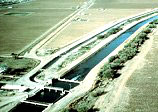|
|
|
Court Approves Water Project Near Mexican Border
Court Watch |
2007/04/09 01:55
|
An appeals court has ruled that the federal government can line a major canal with concrete to stop huge leaks, rejecting arguments that growers across the border in Mexico need the leaking water for their crops.
Proponents of lining the All-American Canal say it would save 67,000 acre-feet of water, enough to meet the needs of more than 500,000 homes in fast-growing San Diego County.
Opponents, who sued to block the project, said it would devastate farmers in the Mexicali Valley.
A three-judge panel of the 9th U.S. Circuit Court of Appeals ruled in favor of a law signed by President Bush last year that orders the Bureau of Reclamation to start the project without delay.
The court's ruling lifts an injunction granted last year when opponents sued.
Although more appeals are possible, the project's supporters said they hoped Friday's decision resolves the issue.
"This is truly a Good Friday," said Daniel S. Hentschke, a San Diego County Water Authority attorney. "This is enormously important for San Diego and the entire state."
The 82-mile-long canal was completed in 1942 to carry water west from the Colorado River. It irrigates crops along both sides of the border in an area about 100 miles east of San Diego.
Opponents of the $200 million project include both environmentalists and business representatives. They said lining a 23-mile section of the canal will dry up tens of thousands of acres of Mexican farmland, allow Mexican wells to become polluted and threaten migratory birds by eliminating wetlands. That could cause significant job losses and other economic problems on both sides of the border, they said.
The court said Mexico already takes 1.5 million acre-feet of Colorado River water a year under the terms of a 1944 treaty and is entitled to no more.
|
|
|
|
|
|
|
Class action or a representative action is a form of lawsuit in which a large group of people collectively bring a claim to court and/or in which a class of defendants is being sued. This form of collective lawsuit originated in the United States and is still predominantly a U.S. phenomenon, at least the U.S. variant of it. In the United States federal courts, class actions are governed by Federal Rules of Civil Procedure Rule. Since 1938, many states have adopted rules similar to the FRCP. However, some states like California have civil procedure systems which deviate significantly from the federal rules; the California Codes provide for four separate types of class actions. As a result, there are two separate treatises devoted solely to the complex topic of California class actions. Some states, such as Virginia, do not provide for any class actions, while others, such as New York, limit the types of claims that may be brought as class actions. They can construct your law firm a brand new website and help you redesign your existing law firm site to secure your place in the internet. |
Law Firm Directory
|
|





